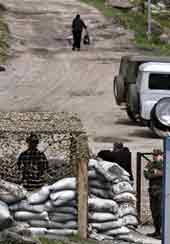Abkhazia wracked by ‘worrying new level of violence’: UN report
By Mikheil Svanidze
Wednesday, July 30

The July 23 report covers events in the conflict zone from April 2, with particular concern for a deadly blast in the border region of Gali which killed four on July 6.
“Coming in the wake of indiscriminate bomb blasts in [Abkhazian towns in June], the Gali bombing marked a worrying new level of violence,” the report reads.
A local interpreter for UNOMIG, the UN mission to Georgia, was killed in the Gali attack and another employee wounded. No one has publicly claimed responsibility for the blast, which targeted a cafe in the evening, but the Abkhaz, Russians and Georgians have all swapped accusations.
“I am deeply concerned by this resort to indiscriminate violence, an unprecedented development with unpredictable consequences for a fragile peace process,” the secretary-general’s report said, warning that the conflict zone remains tense.
Contributing to the tension was an increase in flyovers in the conflict zone, the report continued, including at least two Georgian SU-25s and multiple unmanned spy planes over Abkhaz-controlled territory. A UN investigation concluded that a Russian fighter jet shot down one of the Georgian drones in April.
That shooting was held up by Tbilisi as a prime example of Russian aggression in the region. The UN Security Council twice discussed the attack, which US representative to the UN Alejandro D. Wolff called a “dangerous development” and “highly provocative.”
The Abkhaz and Russians in turn accuse Georgia of stoking the fires in Abkhazia by building up forces in the Kodori Gorge, a rugged slice of land which is the only Tbilisi-controlled portion of Abkhazia. UNOMIG “did not observe signs of a large-scale” buildup there, the report said, but noted its observers were barred from certain areas and that infrastructure works “seem to exceed the requirements for the declared strength” of Georgian forces.
The UN report also casts doubt on Tbilisi's account of an attack on Georgian voters in a conflict zone village on the day of the May parliamentary elections.
Unknown gunmen opened fire with small arms and rocket-propelled grenades on Georgians gathered around a football field near the village of Khurcha, in Georgian-controlled territory near the administrative border with Abkhazia. There was at least one serious injury. Georgian officials blamed Abkhaz militia.
But the report said it is far from clear who was responsible for the attack, which the Abkhaz accused the Georgians of staging: "While no hard evidence has been found so far regarding the identity of the perpetrators, inconsistencies in the circumstances surrounding the incident, in particular the fact that the incident was filmed in such a way as to suggest that events were anticipated rather than simply recorded as they were happening, require UNOMIG to continue its investigation."
A Georgian Foreign Ministry statement noted the report’s release and affirmed Tbilisi’s readiness to work with UN bodies on conflict resolution.
Direct talks between Tbilisi and Sokhumi are officially on hold.
“We will talk with Georgia only if Georgia complies with all the obligations and documents they signed, when they pull out their military troops from Kodori, which were brought there in breach of all prior agreements,” the de facto Abkhaz foreign minister, Sergey Shamba, told the Messenger yesterday.
Tbilisi says it only has police offices allowed by ceasefire agreements in Kodori Gorge.
Another Abkhaz demand is the signing of a non-use of force agreement. Georgia has said the pact would be unnecessary and demeaning, but officials now say it is on the bargaining table—if the Abkhaz sit down to talk.
There is some possibility for that under the auspices of the UN secretary-general’s Group of Friends of Georgia, which is hosting a meeting on the conflict in Berlin toward the end of next month. Both Tbilisi and Sokhumi say they will attend.
Georgian officials say that meeting was originally scheduled for yesterday, but delayed after the Abkhaz requested more time to prepare.
“The meeting was supposed to be held today, but as you see, I am here [in Tbilisi] now,” State Minister for Reintegration Issues Temur Iakobashvili told the Messenger yesterday.
The Abkhaz de facto foreign minister said any meeting will be with concerned members of the international community, not Tbilisi.
“We are going to Germany not to meet with Georgia, but to meet the Group of Friends. These meetings are held biannually starting from 1996. We have never said we were not willing to meet the Group of Friends,” Shamba said. “We are ready to meet the Group of Friends starting from mid-August, on a date desired by the German side.”
Germany is current coordinator for the Group of Friends, and sent its foreign minister to promote its peace plan with Georgian, Abkhaz and Russian officials two weeks ago.
The UN secretary-general’s report made the stakes starkly clear.
“By many accounts, the chain of events that began to unfold in March 2008 brought the Georgian, Abkhaz and CIS peacekeeping forces close to major confrontation in the second half of April,” the report said.
In March tensions climbed as Moscow pulled out of sanctions on Abkhazia, prompting Georgia to decry Russia’s “creeping annexation” of the breakaway region. Most analysts suggested Moscow’s move was linked to February’s international recognition of an independent Kosovo, which Russia opposed, and an April NATO summit at which Georgia and Ukraine hoped to be invited closer to the alliance, against Russian wishes.
